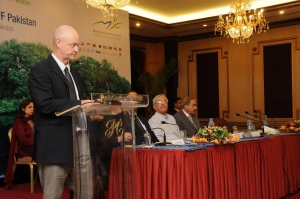9th NCB Inaugural Ceremony and Meeting, MFF Pakistan
Location: Karachi, Pakistan. 25th Apr 2013
Local Organisations Strengthened with Grants worth US$ 310,000 in Pakistan
Karachi, April 25th, 2013 – The inauguration ceremony of the 9th National Coordinating Body (NCB) meeting of the Mangroves for the Future (MFF) was held at Pearl Continental Hotel, Karachi. Honourable Chief Minister of Sindh, Chief Justice (Retired) Zahid Kurban Alavi was the guest of honour.
In his inauguration remarks Justice (Retired) Zahid Kurban Alavi said that “the future lies in partnerships at the local level coupled with regional expertise. I believe the Regional initiatives like MFF are a step in the right direction since it is a Programme that has played the role of a catalyst in promoting regional approach for solutions to many of our common environmental and socio-economic problems”.
The NCB meeting was chaired by Syed Muhammad Ali Gardezi, Secretary, Ministry of Climate Change, Government of Pakistan. In his inauguration remarks he said that “Ministry of Climate Change is working with the provincial governments to implement REDD+ in Pakistan which provides tools and opportunities for carbon trading and earning foreign exchange”.
Coupled with the small yet significant efforts of the successful small and medium grantees of MFF, the government has also stepped in to initiate a large-scale mangrove restoration programme in the Indus Delta, where 100,000 hectares have been earmarked for new plantations in collaboration with IUCN Pakistan.
“The cost of dealing with climate triggered impacts is going up and, according to the assessments, it could be in the range of US$ 6 to 14 billion per year for Pakistan. Already climate triggered natural disasters have cost Pakistan’s economy US$ 10 billion in 2010, making Pakistan, one of the severely hit countries in the world”, says Mahmood Akhtar Cheema, Country Representative, IUCN Pakistan.
“The mission of MFF is to promote healthy coastal ecosystems through a partnership-based, people-focused, policy-relevant and investment-orientated approach, which builds and applies knowledge, empowers communities and other stakeholders, enhances governance, secures livelihoods, and increases resilience to natural hazards and climate change”, says Steen Christensen, MFF Coordinator.
Besides the small and medium grants, MFF is also involved in two regional initiatives funded by UNEP and FAO, which are in process of inception during 2013. These initiatives will focus on addressing issues of coastal erosion and creating financial incentives for the local communities for sustainable management of the coastal resources.
MFF activities in Pakistan are being implemented through small and medium grant projects, which is unique in a way because it is open to a vast segment including, governmental organisations, civil society, media and the academia, who are interested in implementing projects along coast of Pakistan.
The first cycle of MFF Small Grants was implemented during 2011-12 under which nine small grant projects worth US$63000 related to conservation of mangroves and awareness were implemented by different government and non-governmental organisations. These small grants have addressed several themes pertaining to coastal areas, including participatory conservation of mangroves, advocacy and awareness on mangroves and other coastal resources to highlight their roles in disaster risks reduction, livelihoods and environmental management.
Under the currently underway, second and third cycle, eleven small grants worth US$110,000 are being awarded to government and civil society organisations in Sindh and Balochistan provinces for implementation of various small grant projects, whereas, US$ 200,000 are being awarded to three government and non-government organisations for implementation of medium grant projects, including WWF Pakistan, Pakistan Navy and Sindh Livestock & Fisheries Department.

9th NCB Meeting, Karachi, Pakistan © MFF, Pakistan, 2013